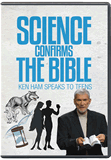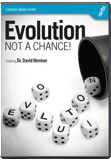Just Show the “Evidence”
A visitor to the Creation Museum is disappointed that the Creation Museum presents a presuppositional approach. Dr. Lisle, AiG–U.S., explains the rationale.
My parents and I recently visited the Creation Museum and were greatly disappointed. We did not feel that enough scientific evidence was given to support creationism. We think a museum should be more about evidence than faith. There seems to be plenty of evidence out there-it is just not presented at all.
—K.S., U.S.
Looking Deeper
I just wanted to thank AiG for this website. Prior to reading the information here on a regular basis, I was questioning how science and the Bible could clash with having the same evidence to look at etc. I never believed that what we have been given through God’s Word was incorrect in any way, but I now have learned to look at the same evidences, think for myself, and see how it fits only within what the Bible tells us. All in all, I have more that I can discuss with friends and family regarding issues where the scientific theory for the day does not fit with what we are told in the Bible and hopefully can help those individuals to realize that their presuppositions are affecting how they see the same evidences . . . . It is great to have this fabulous resource. Thank you all at AiG for all of the research and information you put together for the readers. May God bless you to carry on this work for many years to come!
—D.K., U.S.
Have Something to Add?
Let us know what you think.
Thank you for contacting Answers in Genesis. It is very important to understand that creation is not actually “supported” by science; rather science is supported by creation. Without biblical creation, science would not be possible. Science works because God made the universe and created us in His image; we know this from Genesis. God gave us senses that can probe the universe and minds that can use laws of logic. But science would not make sense if evolution and the big bang were true. Why would we expect the universe to be understandable if it and our minds were simply the random results of molecules in motion? In order for science to make sense, we would already have to have faith in God’s Word. See Evolution: The Anti-Science.
Of course, there is plenty of science that confirms biblical creation (in fact, all of it does when you consider that science requires a biblical worldview). Much of this science is presented in the Creation Museum. Some of this science in the museum is very apparent (such as the information presented in the planetarium, or the Flood geology room). But much of the science is “behind the scenes,” and you may not have noticed it. Did you notice that the animals Adam is naming look a bit different than the varieties we see today? We’ve consulted with experts in baraminology to learn what the original kinds may have looked like. Did you notice that the earth and stars in the Six Days Theater look a bit different than they do today? We’ve used experts in geology and astrophysics to calculate the way these would have looked at creation.
It’s fine to present evidence, but it’s much more important to compare worldviews. Our worldview (our view of the nature of reality and knowledge) tells us what to make of the evidence. If a person has a wrong worldview, no amount of raw evidence will change his or her mind. Jesus tells us in Luke 16:31 that if people do not listen to Moses and the Prophets (i.e. the Bible), they won’t be persuaded even if someone rises from the dead. So, although it is good to share scientific evidence that confirms creation, the most important thing is to help people to understand that without the Bible, they couldn’t make sense of anything at all (Colossians 2:3).
For more information:
Recommended Resources

Answers in Genesis is an apologetics ministry, dedicated to helping Christians defend their faith and proclaim the good news of Jesus Christ.
- Customer Service 800.778.3390
- © 2024 Answers in Genesis






